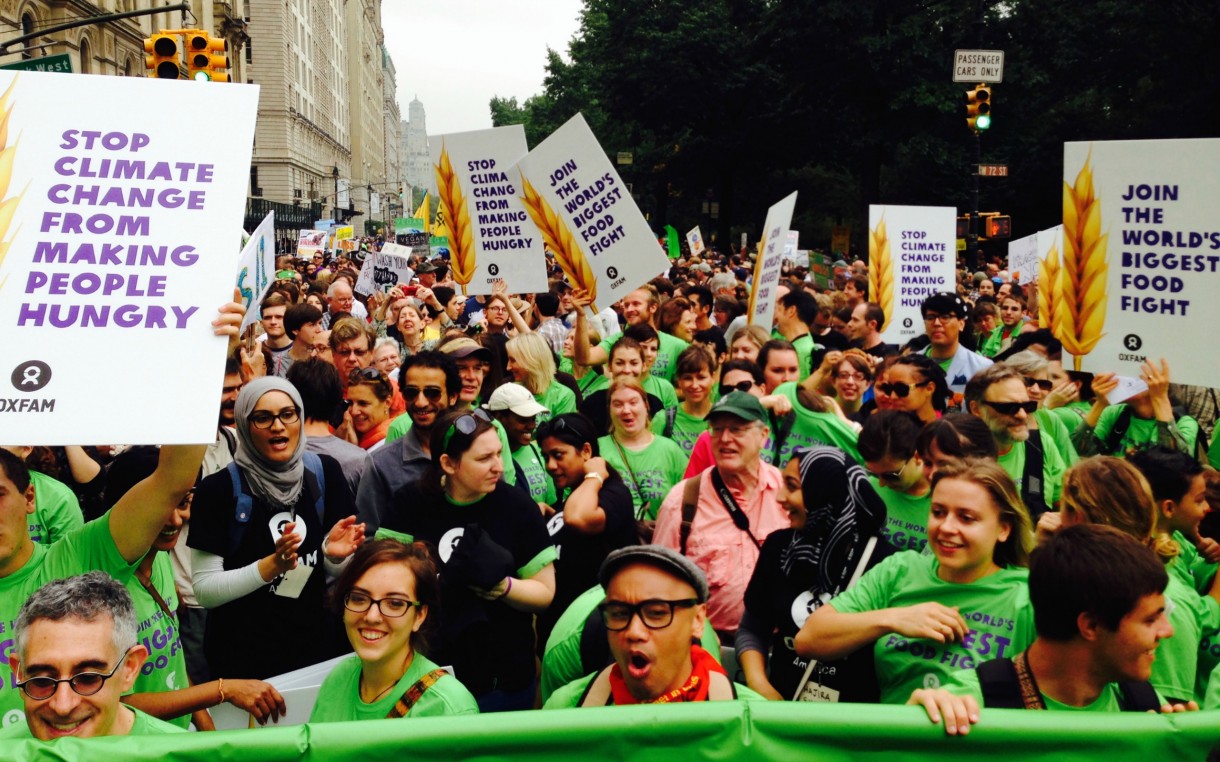Can the food movement flex any political muscle?
 On September 21, Oxfam supporters joined hundreds of thousands of activists came together for the People's Climate March in New York City to demand that government and business leaders take bold action on climate change. Photo: Kaoru Inoue/Oxfam America.
On September 21, Oxfam supporters joined hundreds of thousands of activists came together for the People's Climate March in New York City to demand that government and business leaders take bold action on climate change. Photo: Kaoru Inoue/Oxfam America.
A few glimmers of impact in the 2014 election.
One of these years, the eaters of America are going to demand a place at the table, and we will have the political debate over food policy we need and deserve.
~Michael Pollan, 2007
I’ve been thinking a lot about – and despairing over – the US food movement for a while. On the one hand, I see so much energy, excitement, enthusiasm about food. It’s not just the celebrity chefs and the best-selling authors and all sorts of new media. It’s also an incredible grassroots dynamism, locally-driven initiatives, and a willingness to find linkages and alignment across political, racial, and cultural divides.
On the other hand, despite this noise and bustle, it feels like the US food movement has still not come into any real political power. Elections come and go, and still a militant “food voter” has not emerged. For the most part, food justice issues are no-shows in campaigns and candidates.
Even worse, some politicians are coming to think that there’s a political advantage in doing the wrong thing on food issues. I’m deeply depressed that leading Republicans have begun to align the party against food security and food safety. Straight off the bat, the new chairman of the House Agriculture Committee, for example, has announced that he wants to cut food stamps. As if the cuts in the last Farm Bill weren’t enough. Likewise, Republicans have made it their mission to weaken improved nutrition rules in school lunches, positioning themselves as champions of the obesity epidemic among children. Some of these measures were included in the “cromnibus” legislation moving through Congress last week.
It feels like the food movement is failing. And sadly, it may be falling into the same intractable stalemate that the environmental movement did over many years, although at a much accelerated pace. Environmental issues went from being non-partisan, to being bi-partisan, to being partisan.
In 1988, soon-to-be Republican President Bush said, “I’m an environmentalist,” and proceeded to sign the Clean Air Act, a huge and important piece of environmental legislation with broad support from both parties. Thirteen years later, a different Republican President Bush reneged on a campaign pledge to take action on climate pollution and set a course against environmental protection. Most of the Republicans who cared about environmental concerns had retired or been drummed out of the party. Now, caring about the environment or climate change is, simply, something that Democrats do. Republicans don’t.
I don’t think food policy issues are there yet. But, they are on their way.
One of the reasons that environmental issues became partisan, I believe, is that there was little political price to pay for being anti-environmental. Politicians could say and do the wrong thing, and still face no ill effects in the next election. Likewise, politicians could say and do the right things and get awfully little advantage for it. Environmental groups often punished their friends for small infringements.
These days, politicians face little consequence, positive or negative, for their positions on food issues.
I should note that the last election did have some glimmers of hope in it. While I don’t necessarily agree with every initiative or policy, an accounting shows that there are some areas where voters are taking food policy into their own hands and passing ballot initiatives.
Another bright spot was the Florida District 1 race. There an energetic challenger took on Rep. Steve Southerland (R), a leader (arguably THE leader) in attacking food stamps in the last Farm Bill. It was a point of pride for him. Normally, incumbents are pretty safe, and this was a pretty strong year for Republicans. But the race was targeted by some activists including the Food Policy Action, a new organization dedicated to holding legislators accountable on food and agriculture issues. Chef-activist Tom Colicchio helped lead the charge. They put some money and effort into the race and scored a big result: a very narrow loss (49.3% to 50.5%) for Rep. Southerland.
So maybe there’s a bit of hope.